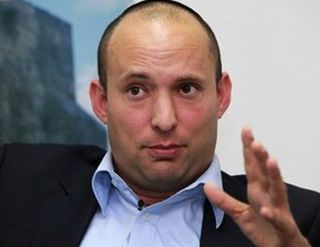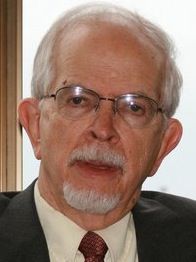
Publisher:
Bonnie King
CONTACT:
Newsroom@Salem-news.com
Advertising:
Adsales@Salem-news.com

~Truth~
~Justice~
~Peace~
TJP
Jan-17-2013 11:58

 TweetFollow @OregonNews
TweetFollow @OregonNews
Election Could Push Israel Further To The Right
Dr. James M. Wall Salem-News.comLikud is losing votes to a party even more conservative. The brash newcomer is the previously little-noticed Bayit Yehudi (Jewish Home) party.
 Bayit Yehudi leader Naftli Bennett. Jerusalem Post photo by Marc Israel Sellem |
(CHICAGO) - Israel’s 19th general election, Tuesday, January 22, is almost certain to be won by Prime Minister Benjamin Netanyahu’s Likud party.
There is no serious Liberal election opposition to Likud. What is serious, however, is the very real possibility that after this election, the Israeli government could turn even harder to the political right.
In the final weeks of the campaign, Likud has been losing votes to a party even more conservative than Likud. The brash newcomer is the previously little-noticed Bayit Yehudi (Jewish Home) party.
The leader of Bayit Yehudi is a 40-year-old charismatic newcomer to Israeli politics, Naftali Bennett (shown above), who has emerged as the hottest new personality on the Israeli political scene.
- Bayit Yehudi has languished in the shadows of recent Israeli elections. It currently has three members in the Knesset. Some polls indicate that number could rise to as many as 15 seats, elevating Bayit Yehudi to a third place finish among the 20 parties currently represented in the Knesset. The two leading parties are expected to be the right-wing alliance of Likud and Avidor Lieberman’s Yisrael Beiteinu.
- Joel Greenberg, reporting for the Washington Post, noted the combination of religious and nationalist themes in one Bayit Yehudi campaign event:
- It was a mostly young crowd that turned out on a chilly winter night to hear Naftali Bennett, the leader of the religious nationalist party Jewish Home [Bayit Yehudi], deliver an appeal for understanding — not between Israelis and Palestinians, but among Israelis themselves.
- “If it’s important for you to return to Jewish values, to connect and break down barriers, then you have a home,” Bennett told the audience gathered in a neighborhood synagogue. “The minute we lower the level of hate, we can solve many problems.”
- The appeal was tailored for a society where fierce debate often pits secular Israelis against ultra-Orthodox Jews, ideological settlers in the West Bank against liberals from places such as Tel Aviv, and the political right against the left.
- But Bennett’s pitch was also unabashedly nationalist, and its popularity — demonstrated by his party’s strong showing in polls ahead of the January 22 elections — reflects the rightward drift of the Israeli electorate. Both secular and religious voters have given Jewish Home [Bayit Yehudi] a boost at the expense of the front-running rightist ticket led by Prime Minister Benjamin Netanyahu.
To form a majority in the 120-seat Knesset, Netanyahu may be forced to add Bayit Yehudi to Likud (Netanyahu) and Yisrael Beiteinu (Lieberman).
If Bayit Yehudi does vault from three to as many as 15 Knesset seats, be prepared to hear more from Naftli Bennett. Based on his well-publicized positions, what we hear will not bode well for peace in the Middle East. And it most certainly would not not bode well for a Palestinian population’s desire for political justice.
The New Yorker’s David Remnick describes Bennett as “a settlement leader, a software entrepreneur, and an ex-Army commando. Bennett is “a man of the far right”, who was elected director general of the Yesha Council, the main political body of the settler movement.
Bennett is not a political newcomer. He worked as chief of staff for Benjamin Netanyahu before running into opposition from Netanyahu’s wife, a clash that has upended other chiefs of staff for political leaders.
Bennett showed a flare for political leadership that played well in the current restlessness of those Israeli voters weary of being told they have to yield land that many feel “belongs” to them. Bennett developed a strong set of conservative convictions which Stanger explains:
- Closer to his ideological core is an unswerving conviction that the Palestinian Arabs of Gaza, the West Bank, and East Jerusalem might as well relinquish their hopes for a sovereign state. The Green Line, which demarcates the occupied territories from Israel proper, “has no meaning,” he says, and only a friyer, a sucker, would think otherwise.
- As one of his slick campaign ads says, “There are certain things that most of us understand will never happen: ‘The Sopranos’ are not coming back for another season . . . and there will never be a peace plan with the Palestinians.”
Bennett does not live in a settlement. It is ideology and nationalism, not residence, that unites Bennett to his party. He lives in Ra’anana, a small city north of Tel Aviv that Remnick says is full of “programmers and executives”, many of whom share his pro-settlement views.
Bayit Yehudi’s political program unites the settler movement with the religious/nationalist conservatives who share the party’s rejection of any further talk of a two-state “solution”.
Remnick quotes Bennett: “I will do everything in my power to make sure [the Palestinians] never get a state.” ”No more negotiations, no more illusions.”
- To Bennett, there is nothing complex about the question of occupation. There is no occupation. “The land is ours”: that is pretty much the end of the debate.
- “I will do everything in my power, forever, to fight against a Palestinian state being founded in the Land of Israel,” he said. “I don’t think there is a clear-cut solution for the Israeli-Arab conflict in this generation.”
During the recent assault on Gaza, Bennett was a proponent of a ground invasion and criticized Netanyahu when he limited the conflict to a week of air strikes.
This kind of talk has apparently electrified younger, prosperous and ideological conservative voters, who embrace the settlements as righteous claimants to the land that “belongs to Israel”.
David Remnick offers this closing word on Naftali Bennett:
- If Bennett becomes Prime Minister someday—and his ambition is as plump and glaring as a harvest moon—he intends to annex most of the West Bank and let Arab cities like Ramallah, Nablus, and Jenin be “self-governing” but “under Israeli security.”
What would Chuck Schumer, the Israeli clearance officer for President Obama’s cabinet appointments, think about that development?
Please visit Jim's Website, Wall Writings
http://wallwritings.me/2013/01/17/election-could-push-israel-further-to-the-right/

Journalism was Jim Wall’s undergraduate college major at Emory University, Atlanta, Georgia. He has earned two MA degrees, one from Emory, and one from the University of Chicago, both in religion. An ordained United Methodist clergy person; he and his wife, Mary Eleanor, are the parents of three sons, and the grandparents of four grandchildren. They live in Elmhurst, Illinois.
Jim served for two years on active duty in the US Air Force, and three additional years in the USAF (inactive) reserve. While serving with the Alaskan Command, he reached the rank of first lieutenant. He has worked as a sports writer for both the Atlanta Journal and Constitution, was editor of the United Methodist magazine, Christian Advocate for ten years, and editor and publisher of the Christian Century magazine for 27 years, starting in 1972. Time magazine wrote about the new editor, who arrived at the Christian Century determined to turn the magazine into a hard-hitting news publication. The inspiration for Wall Writings comes from that mindset and from many other sources that have influenced Jim’s writings over the years, including politics, cinema, media, American culture, and the political struggles in the Middle East. Jim has made more than 20 trips to that region as a journalist, during which he covered such events as Anwar Sadat’s 1977 trip to Jerusalem, and the 2006 Palestinian legislative election. He has interviewed, and written about, journalists, religious leaders, political leaders and private citizens in the region. You can write to Jim Wall at jameswall8@gmail.com.
-------------------------------
 |
 |
 |
Articles for January 16, 2013 | Articles for January 17, 2013 | Articles for January 18, 2013

googlec507860f6901db00.html
Salem-News.com:



Terms of Service | Privacy Policy
All comments and messages are approved by people and self promotional links or unacceptable comments are denied.
[Return to Top]
©2025 Salem-News.com. All opinions expressed in this article are those of the author and do not necessarily reflect those of Salem-News.com.